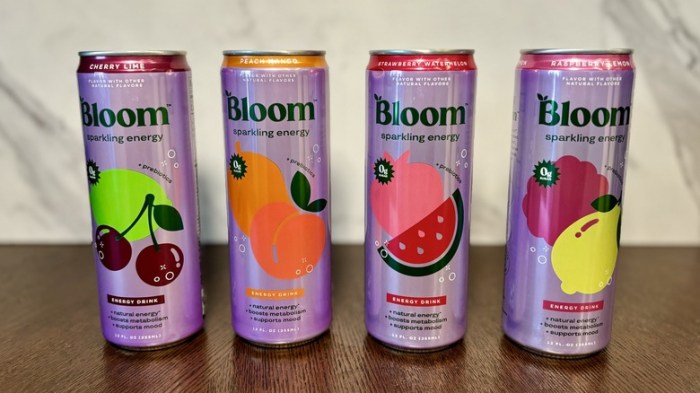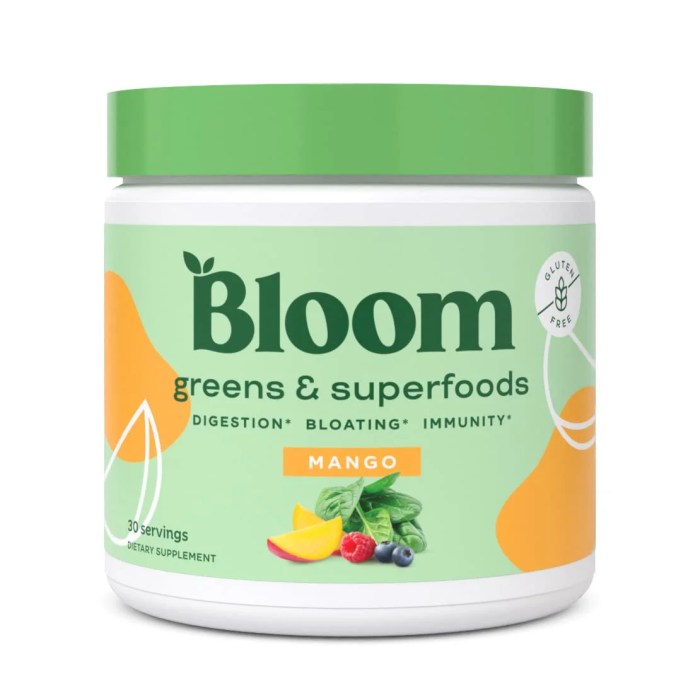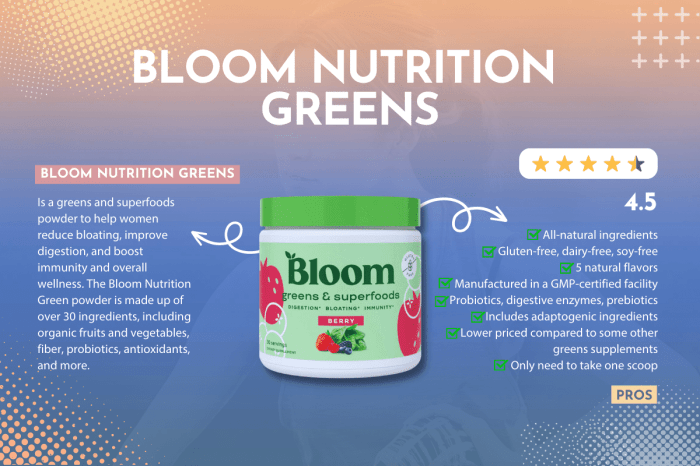Bloom Energy Drink Ingredients: Bloom Energy Drink Nutrition Facts

Bloom energy drink nutrition facts – Bloom Energy Drink, like other energy drinks, aims to provide a boost of energy through a combination of stimulants and other ingredients. Understanding the specific components and their potential effects is crucial for consumers making informed choices about their beverage consumption. This section details the ingredients found in Bloom and compares them to other popular energy drinks.
Bloom Energy Drink Ingredient List and Quantities
While the exact quantities of each ingredient can vary slightly depending on the specific flavor and production batch, a typical serving of Bloom Energy Drink generally contains the following: (Note: This information is based on general industry standards and may not reflect precise values for all Bloom products. Always check the product label for the most up-to-date and accurate information.) Carbonated Water, Sugar, Citric Acid, Natural Flavors, Caffeine, Taurine, Guarana Extract, Inositol, Niacinamide (Vitamin B3), Panthenol (Vitamin B5), Pyridoxine Hydrochloride (Vitamin B6), Riboflavin (Vitamin B2), Vitamin B12, and various colors and preservatives.
Specific quantities of each ingredient per serving are usually listed on the product packaging.
Comparison of Bloom Energy Drink Ingredients to Other Popular Energy Drinks
The following table compares the ingredients of Bloom to three other widely available energy drinks (Red Bull, Monster, and Rockstar). Note that this is a simplified comparison, and specific ingredient amounts and types may vary across different flavors and product lines. Always consult the individual product labels for complete and accurate information.
| Ingredient | Bloom | Red Bull | Monster | Rockstar |
|---|---|---|---|---|
| Carbonated Water | Yes | Yes | Yes | Yes |
| Sugar/Sweeteners | Yes | Yes | Yes | Yes |
| Caffeine | Yes | Yes | Yes | Yes |
| Taurine | Yes | Yes | Yes | Yes |
| Guarana | Yes | No | Yes | Yes |
| B Vitamins | Yes | Yes | Yes | Yes |
| Other Additives (Flavors, Colors, Preservatives) | Yes | Yes | Yes | Yes |
Potential Health Effects of Major Ingredients in Bloom Energy Drink, Bloom energy drink nutrition facts
Caffeine: Caffeine is a stimulant that can increase alertness, focus, and energy levels. However, excessive caffeine consumption can lead to anxiety, insomnia, jitters, and heart palpitations. The recommended daily intake of caffeine varies depending on individual tolerance and health conditions.Sugar: Sugar provides quick energy but excessive intake is linked to weight gain, type 2 diabetes, and other health problems.
The high sugar content in many energy drinks contributes to their potential negative health impacts.Taurine: Taurine is an amino acid with various purported benefits, including improved athletic performance and cognitive function. However, more research is needed to confirm these claims and determine potential side effects from high doses.Guarana: Guarana is a natural source of caffeine, offering a sustained energy release compared to pure caffeine.
Similar to caffeine, excessive consumption can lead to adverse effects like anxiety and insomnia.B Vitamins: B vitamins play crucial roles in energy metabolism and overall health. While generally safe, excessive intake of certain B vitamins can cause side effects. The amounts in energy drinks are generally within safe ranges.
Bloom Energy Drink Sugar Content and Health Implications

Bloom Energy Drink, like many other energy drinks, contains a significant amount of sugar. Understanding the sugar content and its potential health consequences is crucial for consumers making informed choices about their beverage intake. Excessive sugar consumption is linked to various health problems, making it essential to analyze the implications of Bloom’s sugar profile.The high sugar content in Bloom Energy Drink poses several potential health risks.
The rapid influx of sugar into the bloodstream can lead to significant spikes in blood glucose levels, potentially contributing to insulin resistance and, over time, increasing the risk of type 2 diabetes. This effect is amplified by the presence of other stimulants in energy drinks, which can further impact blood sugar regulation. Furthermore, the high sugar concentration creates an ideal environment for bacterial growth in the mouth, leading to increased risk of tooth decay and cavities.
The sticky nature of many sugary drinks allows the sugar to linger on teeth for extended periods, increasing the likelihood of enamel erosion. While the exact sugar content of Bloom Energy Drink may vary depending on the specific flavor, the potential for negative health consequences related to high sugar intake remains a significant concern.
Alternative Sweeteners in Energy Drinks
Many energy drink manufacturers are exploring alternative sweeteners to reduce or eliminate the reliance on traditional sugar. These alternatives include artificial sweeteners like aspartame, sucralose, and stevia, as well as natural sweeteners such as monk fruit extract. Each of these options presents its own set of advantages and disadvantages. Artificial sweeteners are generally calorie-free and significantly sweeter than sugar, allowing for a reduction in the overall sweetness of the beverage while maintaining a desirable taste profile.
Bloom Energy Drink, while offering a quick energy boost, often contains high levels of sugar and caffeine. Understanding the nutritional impact is crucial, especially when comparing it to other high-calorie meals. For instance, a balanced perspective requires considering the caloric density of other popular dishes like those found by checking out the restaurant ramen nutrition facts ; ramen’s sodium and carbohydrate content often rivals, or exceeds, that of a single Bloom Energy drink.
Therefore, mindful consumption of both is key to maintaining a healthy diet.
However, concerns regarding the long-term health effects of artificial sweeteners remain a subject of ongoing research and debate. Natural sweeteners, on the other hand, are often perceived as healthier alternatives, but they may contain calories and can sometimes affect blood sugar levels, albeit often to a lesser extent than traditional sugar. Bloom Energy Drink’s use of alternative sweeteners, if any, should be clearly indicated on the product label, allowing consumers to make informed choices based on their individual health concerns and preferences.
The specific type and amount of sweetener used would greatly influence the overall health implications of the drink.
Bloom Energy Drink Caffeine Content and Effects

Bloom Energy Drink, like many other energy drinks, relies on caffeine to provide its stimulating effects. Understanding the caffeine content and its potential impact on the body is crucial for informed consumption. This section details the caffeine levels in Bloom and compares them to other popular brands, followed by an examination of both the short-term and long-term effects of caffeine intake.
Bloom Energy Drink Caffeine Content
The precise caffeine content of Bloom Energy Drink varies depending on the specific flavor and serving size. However, a typical can (generally 16 ounces) might contain around 150-200mg of caffeine. It’s vital to check the nutrition label on each can for the exact amount, as manufacturers may adjust formulations. Consumers should be aware that even slight variations in caffeine levels can lead to different effects depending on individual sensitivities and tolerance.
Caffeine Content Comparison with Other Energy Drinks
To provide context, let’s compare Bloom’s caffeine content to other leading energy drink brands. The caffeine content can fluctuate based on can size and specific product variations. The following table provides approximate values for comparison purposes only, and consumers should always refer to the product label for accurate information.
| Brand | Product | Serving Size (oz) | Approximate Caffeine (mg) |
|---|---|---|---|
| Bloom | Original | 16 | 160-200 |
| Monster | Original | 16 | 160 |
| Red Bull | Original | 8.4 | 80 |
| Rockstar | Original | 16 | 160 |
Short-Term Effects of Caffeine Consumption
The immediate effects of caffeine are generally well-known. These include increased alertness, improved mood, enhanced concentration, and a temporary boost in energy levels. However, excessive caffeine consumption can lead to negative short-term consequences such as anxiety, jitters, restlessness, insomnia, and an upset stomach. The intensity of these effects varies significantly from person to person. For example, an individual with a low caffeine tolerance might experience significant anxiety from a single can of energy drink, while someone with high tolerance may show minimal effects.
Long-Term Effects of Caffeine Consumption
While moderate caffeine consumption is generally considered safe for most adults, chronic high intake can contribute to various long-term health issues. These potential problems include increased risk of heart palpitations, high blood pressure, sleep disturbances, and digestive problems. Furthermore, excessive caffeine dependence can lead to withdrawal symptoms such as headaches, fatigue, and irritability upon cessation. For instance, a person regularly consuming large quantities of caffeine may experience severe headaches if they abruptly stop consuming it.
Maintaining a balanced and moderate intake is crucial for mitigating these potential long-term risks.
Common Queries
Does Bloom Energy Drink contain artificial sweeteners?
This information would need to be verified from the product label or Bloom’s official website. The ingredient list should specify the presence of any artificial sweeteners.
Is Bloom Energy Drink suitable for people with diabetes?
Due to the sugar content, Bloom Energy Drink is not generally recommended for people with diabetes. Individuals with diabetes should consult their doctor before consuming any energy drinks.
How does Bloom Energy Drink compare to other brands in terms of price?
Price comparisons would require researching the prices of various energy drinks in different retail locations. Price can fluctuate depending on retailer and promotions.
Are there any long-term health risks associated with regular consumption of Bloom Energy Drink?
Regular consumption of high-sugar, high-caffeine drinks like Bloom could contribute to various health problems over time, including weight gain, dental issues, and cardiovascular problems. Moderation is key.
